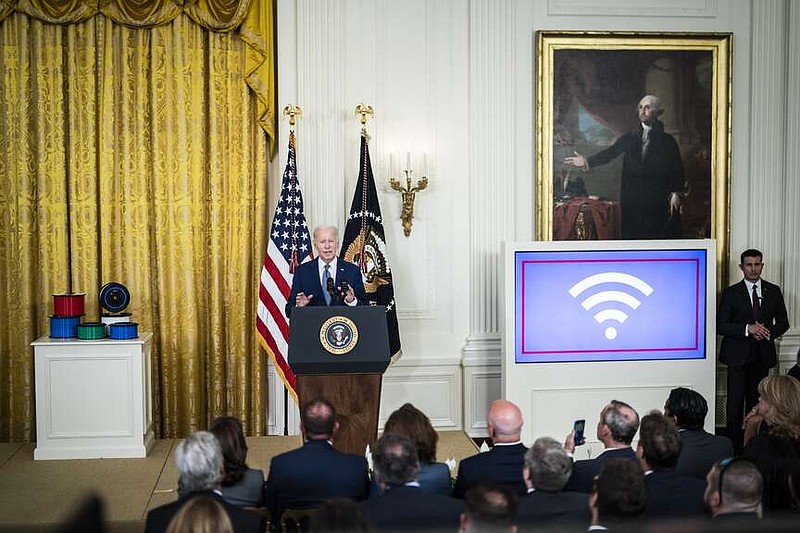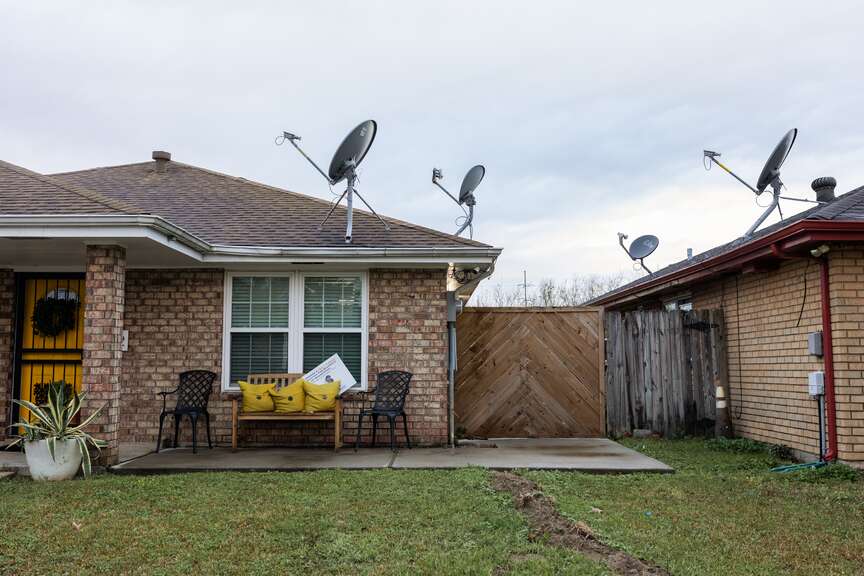AT&T, Charter, Comcast and Verizon are working to weaken a $42.5 billion federal program to improve internet access across the nation, aiming to block strict new rules that would require them to lower their poorest customers' monthly bills in exchange for a share of the federal aid.
In state after state, the telecom firms have blasted the proposed price cuts as illegal -- forcing regulators in California, New York, South Carolina, Tennessee, Virginia and elsewhere to rethink, scale back or abandon their plans to condition the federal funds on financial relief for consumers.
The lobbying campaign threatens to undermine the largest burst of money to upgrade the country's internet service in U.S. history. Enacted by President Biden as part of a sprawling 2021 infrastructure law, the funds are intended to deliver speedy and affordable broadband to the final unserved pockets of America by 2030 -- a goal that the White House likens to the federal campaign nearly a century ago to electrify the nation's heartland.
For some state and federal officials, though, the fear is that the huge influx of aid could fall short of its potential, particularly if Americans cannot afford the new broadband service.
"We will not get a chance to spend tens of billions of dollars to connect Americans again," said Alan Davidson, the director of the National Telecommunications and Information Administration (NTIA), an arm of the Commerce Department overseeing the program.
Telecom companies have focused their lobbying on the states, which are tasked with doling out the money. In Virginia, for example, AT&T hinted at the possibility of litigation if the state capped prices for low-income households as a condition of participating in the program. Officials in South Carolina and Tennessee, meanwhile, neutered key proposals to limit poorer residents' monthly bills amid opposition from cable and internet providers.
Other states including Michigan, Missouri and New York relaxed some pricing requirements at the insistence of groups including USTelecom, which represents AT&T and Verizon. In California, the group said regulators' approach "amounts to unfair market interference," an argument later echoed by Republicans in Congress, some of whom have benefited from industry donations.
Often, the largest telecom companies have questioned the legality of the government's attempts to limit broadband prices under the infrastructure law. Some companies have signaled that undesirable regulation could cause them to walk away from the program entirely, jeopardizing Biden's ambitions to bring internet to the communities that still do not have it.
"Rate regulation is exactly a formula that will not allow the kind of flexibility that will ensure the overall [broadband] program will be a success," said Jonathan Spalter, the president of USTelecom.
But consumer advocates counter that the industry is merely trying to reap the benefits of a new federal windfall without addressing one of consumers' oldest complaints about broadband: the price.
"This is a requirement in exchange for a humongous government benefit," said Gigi Sohn, executive director of the American Association for Public Broadband, which advocates for low-cost options. "The kind of notion that government can require something in exchange for giving out billions of dollars, that's standard."
The political wrangling carries great consequence for the roughly 8.5 million U.S. households and small businesses that still do not have access to modern-day connectivity. For decades, the government has spent billions of dollars to try to narrow this chasm, only to stumble amid industry lobbying and complicated market forces.
The latest injection of aid arrived in 2021, when Congress established the Broadband Equity, Access and Deployment Program, known as BEAD, as part of the infrastructure law. The program allowed local officials to decide how to spend their portion of the roughly $42.45 billion pot, but it set some basic national parameters, primarily to ensure that newly built networks are affordable. In detailed guidelines issued in 2022, the Biden administration suggested that internet plans should cost consumers no more than $30 per month -- though it allowed local officials to propose alternatives.
"There's a recognition, right there upfront, that if you build it, it doesn't mean they're going to come," said Raza Panjwani, a senior policy counsel at New America's Open Technology Institute, which has advocated for low-cost broadband options. "You have to build it, [and] you have to make it affordable."
By June 2023, the Commerce Department divvied up the money among the states, which started to design intricate plans for how to award grants to companies that would build out new networks. Spalter, the head of USTelecom, described the process at the time as a "vital step forward toward making the goal of internet for all a reality in our nation."
Behind the scenes, though, lobbyists for AT&T, Charter, Comcast and Verizon began trying to block any restrictions on what they might charge customers served by taxpayer dollars.
As Michigan readied its plans for roughly $1.5 billion in new federal funds, a top lobbying group for Charter and Comcast warned the state's broadband office in December against strict limits on prices. In a letter, the Michigan Cable Telecommunications Association said price limits for low-income residents would be "heavy-handed" and "impermissible." The group did not immediately respond to a request for comment. Comcast and Charter declined to comment.
New York officials opted to grant the industry more leeway, settling on a $65 maximum monthly charge for low-income customers on new federally financed networks. But Paul Vasington, a director of public policy at Verizon, tried to dissuade the state in December, noting that pricing caps "could discourage participation" by telecom giants. In a statement, Katharine Saunders, the deputy general counsel at the wireless company, added that states needed to work with "experienced providers" to build new networks and "make universal broadband a reality."
To sway regulators, telecom companies and lobbyists have stressed that most internet providers already offer special low-cost plans for needy families, though exact web speeds, prices and eligibility criteria can vary dramatically. They also point to a provision in the infrastructure law that bars the government from trying to "regulate the rates charged for broadband service." Internet providers, who lobbied for that prohibition in 2021, maintain that most efforts to tie federal funds to specific pricing changes are illegal.


